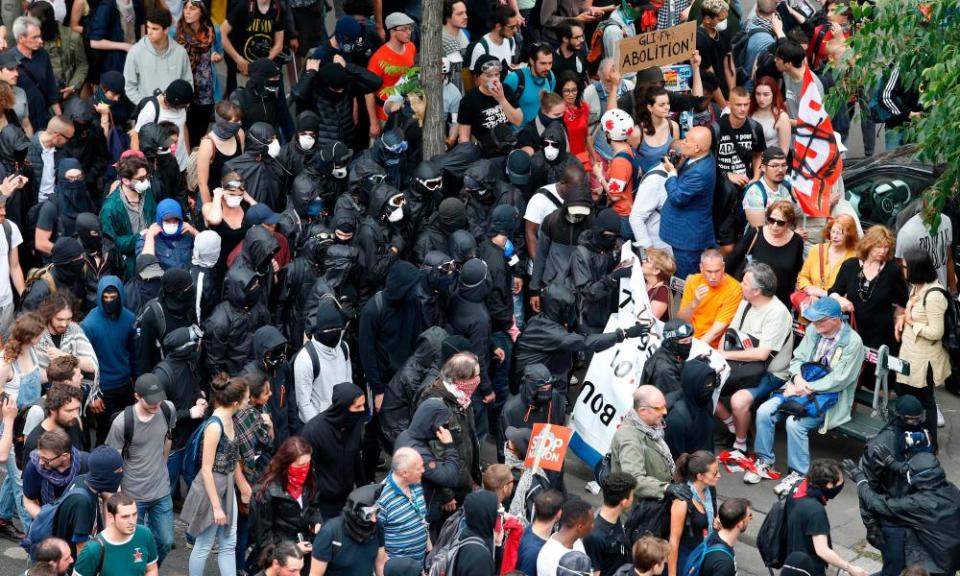French unions accused of 'passive complicity' in protest violence

The French interior minister has accused protesters against Emmanuel Macron’s economic reforms of “passive complicity” with people who have smashed shops and banks and set fire to cars during demonstrations.
Gérard Collomb was speaking after marchers converged on the Bastille in Paris on Saturday to show their opposition to the changes being pushed by the president.
Recent demonstrations have resulted in violent clashes with police as hooded and masked young people smash shop and restaurant windows and set fire to buildings and vehicles.
Collomb accused the trade unions organising the protest marches of being passive in the face of violence from so-called “black bloc” anti-capitalists, and that this made the unions complicit.
He said: “What is astonishing is that the black blocs can do what they are doing in the middle of a crowd that, at the end of the day, does nothing. If we want to have the right to demonstrate, those taking part must oppose those smashing things up and not, by their passiveness, be accomplices to what is happening from a certain point of view.”
The minister’s comments sparked furious responses from government opponents who described them as scandalous and irresponsible.
Benoît Hamon, a former presidential candidate for the Parti Socialiste, said: “It’s for the police to protect the demonstrations instead of making us responsible for the behaviour of an ultra-violent few.”
Alexis Corbière of the France Insoumise party told Le Figaro: “When there’s a major sporting or cultural event, are those taking part responsible for the acts of a tiny minority? Collomb is behaving as a provocateur. What’s worrying is that this man is in charge of our freedoms.”
French train drivers who reject the centrist government’s plans to shake up the state-owned railway, SNCF, are entering a third month of rolling strikes this week. In recent demonstrations, the drivers have been joined by Air France staff, students and other workers challenging Macron’s reforms.
However, peaceful union-led marches have been hijacked by anti-capitalists armed with bars, sticks, stones a molotov cocktails. Black bloc members wear black clothing and cover their faces with scarves, hoods, balaclavas and motorcycle helmets, not only to hide their identity but lessen the effects of teargas used by riot police. The Black bloc movement has its roots in the autonomist protests of Germany in the 1980s.
On Saturday, a “popular tide” demonstration against Macron brought about 32,000 people, according to an independent count, on to the streets of Paris. The police claimed there had been 21,000 protesters, the CGT union, which organised the event, said there were 80,000.
Police arrested 43 people suspected of planning “vandalism” or “carrying weapons”, of whom 26 were placed in custody.
Other demonstrations were held elsewhere in France, including Marseille and Nantes.
Ian Brossat, the deputy mayor of Paris, tweeted that the suggestion demonstrators were “complicit” with the vandals was “truly scandalous”.
He said: “Making sure people smashing things up are not able to do so is the work of the forces of law and order. This is a pathetic attempt to shift all responsibility and discredit the protest.”

 Yahoo News
Yahoo News 